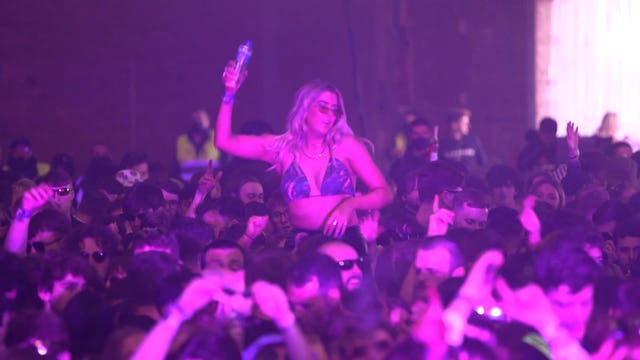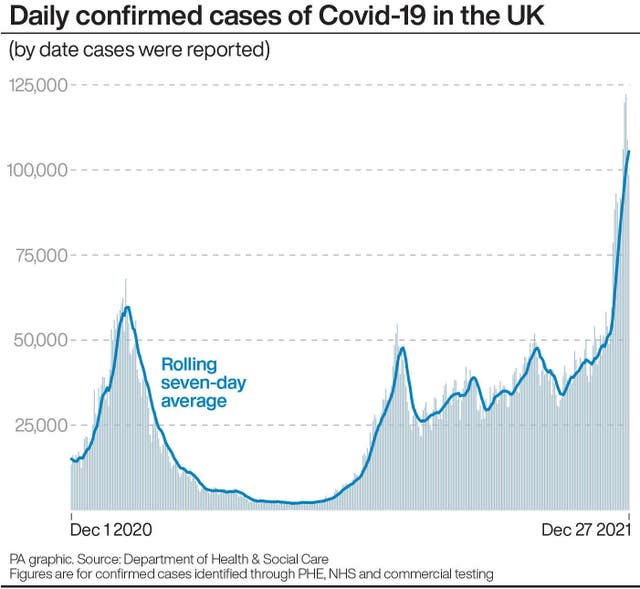New year parties given go-ahead in England as UK splits over Omicron controls
The Prime Minister said there would be no restrictions introduced before January.

New Year’s Eve parties have been given the green light in England as ministers announced there will be no new coronavirus restrictions imposed before the end of 2021.
In a move welcomed by hospitality bosses, Health Secretary Sajid Javid announced there will be no curbs on social mixing beyond the current Plan B measures.
But the Cabinet minister, in a move that appeared to be echoed by the Prime Minister, left the door open for fresh measures to be potentially introduced in January.
Boris Johnson tweeted on Monday there would be “no new restrictions introduced in England before the New Year”.
It came after Mr Javid urged people to “remain cautious” during celebrations to mark the arrival of 2022, recommending partygoers take a test and stay outside where possible to minimise the risk of infection.
“Please remain cautious and when we get into the new year, of course, we will see then whether we do need to take any further measures, but nothing more until then, at least,” added the Health Secretary.
With pubs, bars and restaurants hard hit in the run-up to Christmas due to mass cancellations over Omicron variant fears, UKHospitality chief executive Kate Nicholls said the decision to not go beyond Plan B measures in England presented a “lifeline” for the sector.
Mark Davyd, chief executive of Music Venue Trust, told the PA news agency there would “obviously be some relief” among hospitality bosses but called for help to improve ventilation in venues along with “more clarity” on the Government’s long-term vision.
The decision on restrictions, which came after the Prime Minister had been briefed on the latest Covid data by chief medical officer Professor Chris Whitty and chief scientific adviser Sir Patrick Vallance, means nightclubs can remain open for Friday’s partying and there will be no limits on numbers in pubs.
Covid passes will be mandatory for large events, as per Plan B rules, which also include work from home guidance and increased mask wearing in public places.
Conservative MPs who recently inflicted the largest rebellion of his premiership on Mr Johnson over the introduction of Covid passes were among those to welcome Monday’s announcement.
Former minister Mark Francois told GB News: “It is remarkable how a backbench rebellion of 101 MPs focuses minds, isn’t it?
“Let’s not be churlish, this is the right decision. At some point we have to trust people to exercise their nous and I believe that is the essence of the decision.”

The lack of new measures puts England out of kilter with the rest of the UK, with those in Wales and Scotland living with curbs on hospitality including the closure of nightclubs.
First Minister Nicola Sturgeon, speaking after Scottish government provisional data showed the Christmas period had seen the highest number of Covid-19 cases north of the border since the start of the pandemic, urged people to limit socialising in person “as much as possible”.
UK Government data also showed that a record was set in England on Christmas day in terms of recorded cases, with 113,628 infections reported on December 25.
NHS England declared there were 1,281 Covid-19 hospital admissions in the country on Christmas Day – up 74 per cent week-on-week and the highest number since February 16.

It remains well below the second wave of the coronavirus peak, when admissions topped off at 4,134 on January 12.
A total of 8,474 people were in hospital in England with Covid-19 as of 8am on December 27 – the highest number since March 5.
But that too is far lower than the last winter peak of 34,336 Covid patients in hospital, which occurred on January 18, with hopes growing Omicron will prove to be milder than previous virus variants.
Chris Hopson, chief executive of NHS Providers, which represents NHS trusts in England, said there had been a growing number of Covid hospital admissions but “not precipitately so”.
Trusts are not reporting large numbers of patients arriving with Covid-type breathing problems like last January, Mr Hopson added.
But he warned that a high number of staff absences in the NHS – with Omicron-enforced isolation seen as a major cause – are creating such pressures that “even relatively small numbers of extra Covid cases may bring difficult decisions”.





